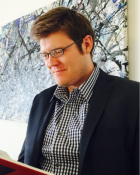
Matthew Heyn

Jordan Wallace-Wolf
Matthew Heyn ‘00 is Deputy Attorney General with the California Department of Justice. Jordan is pursuing the joint JD/PhD in our Law and Philosophy Program. He has completed the JD and is currently writing a dissertation on privacy.
JW: Describe your current job for an audience not familiar with law.
MH: I’m a Deputy Attorney General with the California Department of Justice. I represent California and its agencies in all aspects of civil litigation. Civil litigation is a wide area of practice that encompasses everything except putting people in jail. For example, I currently represent the State and its agencies in litigation arising out of the 2015 oil spill in Santa Barbara. I also represent the Department of Insurance in a hotly-contested dispute as to whether an insurance company should be required to give rebates to the purchasers of homeowners’ policies.
JW: What do you find most satisfying about it?
MH: It’s intellectually challenging and righteous work. Every day I go into the office and resolve difficult and important problems for the State of California. I use reason and argument to persuade courts and clients to do the right thing. And, I’m given a tremendous amount of discretion in how to get the State and its agencies to a favorable result.
JW: Has your overall career path been altered by philosophical study?
MH: Yes. At UCLA I focused my studies on ethics and political philosophy. Because of this, I place I high value on doing meaningful work and the importance of justice in the well-functioning state. John Rawls said “Justice is the first virtue of social institutions, as truth is of systems of thought. A theory however elegant and economical must be rejected or revised if is untrue; likewise laws and institutions no matter how efficient and well-arranged must be reformed or abolished if they are unjust.” If Rawls is right, then lawyers have a vital role to play in a well-functioning state and I believe it is a privilege to be part of the mechanism of justice. I spent the early part of my career in some very prestigious and high-paying positions. It was great training. However, three years ago, I made a big transition to work for the Department of Justice. Now I work for justice and it’s fun and gratifying.
JW: What did you most enjoy about undergraduate and where did you put most of your focus?
MH: My undergraduate years felt like a magical time. I remember being overwhelmed by the opportunity to explore in a world of ideas. I didn’t have to train for anything specifically. I could just engage in the joy of learning new things. I could have world-class geniuses tell me the fundamentals of their area of study and a little bit about what they were working on. I loved it.
JW: How would one go about deciding whether to go to law school?
MH: It’s a huge financial and life commitment, and not everyone enjoys practicing law after law school. Just because you go to law school, doesn’t mean you have to be a lawyer, but it’s the usual path and too many people go to law school without giving careful thought to whether they would enjoy being a lawyer.
Someone who thinks he or she might be interested in working in the law should try to get an internship or a part-time job that gives him or her some exposure to what lawyers do on a day-to-day basis. The best way to end up in a life that you like is to find someone who has that life, see if it really is enjoyable (even in the concrete details), and see how he or she did it.
JW: And how would one go about preparing for law school if one decided to go?
MH: A philosophy degree is great preparation for law school. Most law schools teach the law primarily by have students analyze judicial opinions, which are in the form of arguments. Philosophy students in law school have an advantage because they are taught how to rigorously analyze arguments. Philosophy students know how to read slowly and charitably construe opposing positions. That is very valuable.
JW: What did you do in law school and what would you recommend for students who want to attend?
MH: First, I worked hard in law school. Unlike during undergrad, I didn’t have a part-time job; I treated being ready for my classes as a full-time job. So I studied 40 hours per week (more during finals, less during other parts of the year). Working hard is critical in the first two years; less so after that.
Second, I took classes that I found interesting. I think that helped me do well in my classes. When I care about the subject matter of a course, I can internalize it better. For some classes, I still remember the details because they were so important to me when I was a law student.
Finally, I got involved in worthy organizations. In law school there are a lot of opportunities to use your knowledge to do good. If you don’t use those opportunities, you are not going to get a full educational experience. Moreover, the extracurricular organizations will give you opportunities to get to know your classmates, who might be your referral sources, colleagues, or business partners for the rest of your career. (I met my wife in law school.)
“If Rawls is right, lawyers have a vital role to play in a well-functioning state and I believe it is a privilege to be part of the mechanism of justice.”
JW: Last question: how has philosophy affected your life outside of work?
MH: I continue to read philosophy, in books and articles. I enjoy puzzling over new ideas and discussing them with my friends who are trained in philosophy. Also, I recently took a great online philosophy course. Philosophy has lent itself well to me examining and re-examining my own life. I like to think about whether I am living a good, meaningful life. Philosophy and my faith facilitate that.



